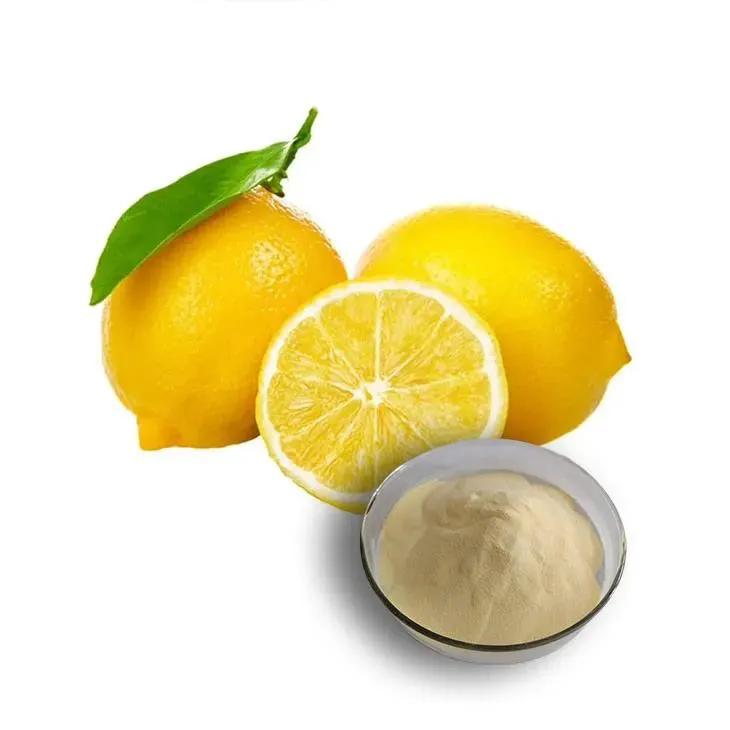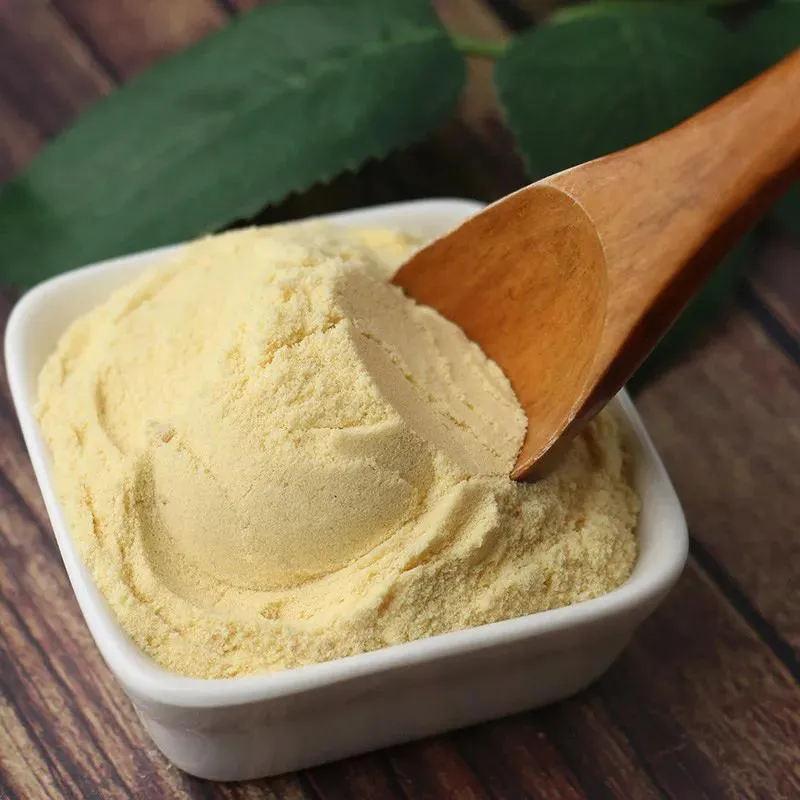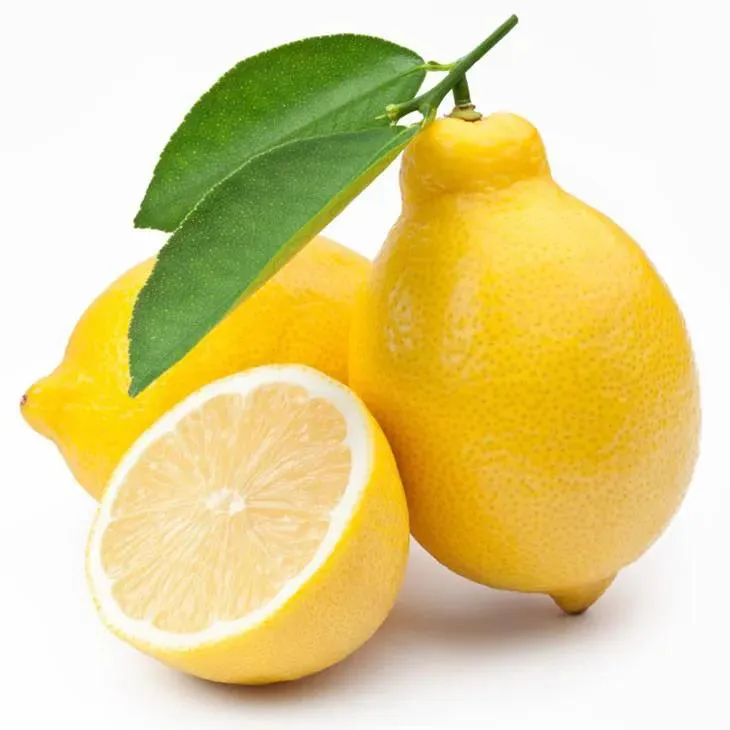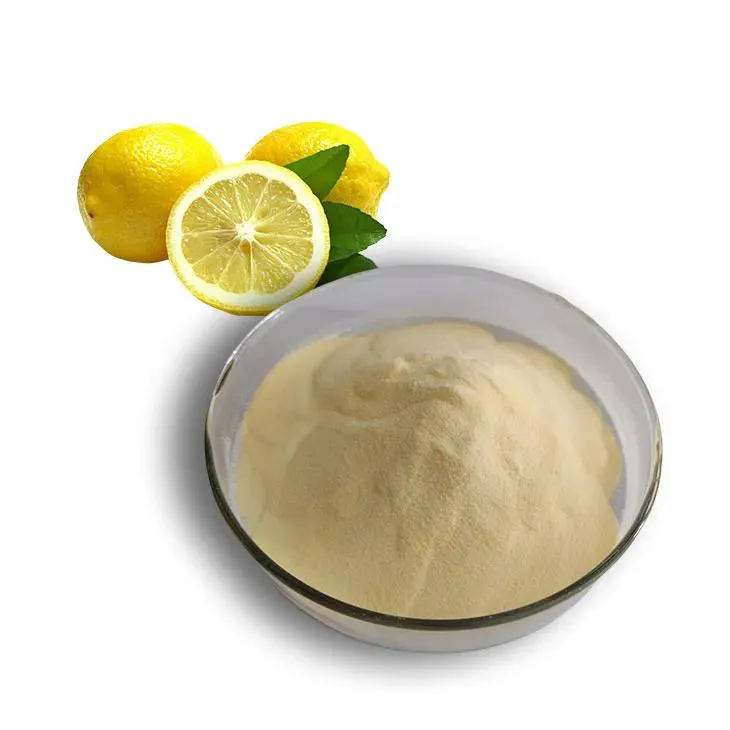- 0086-571-85302990
- sales@greenskybio.com
Lemon Juice Powder: Benefits, Uses and Possible Side Effects
2024-11-13

1. Introduction
Lemon Juice Powder is a convenient and versatile product that has been gaining popularity in recent years. It is made by dehydrating fresh lemon juice, which concentrates its flavors and nutrients. This powder can be used in a variety of ways, from adding a tangy flavor to food and drinks to providing potential health benefits. However, like any product, it also has some possible side effects that consumers should be aware of. In this article, we will explore the benefits, uses, and possible side effects of Lemon Juice Powder in detail.

2. Benefits of Lemon Juice Powder
2.1. Rich in Nutrients
Lemon juice powder contains a variety of important nutrients. It is a good source of vitamin C, which is an antioxidant that helps boost the immune system, protect cells from damage, and promote healthy skin. Additionally, it contains small amounts of other vitamins and minerals such as potassium, which is important for heart health and maintaining proper fluid balance in the body.
2.2. Boosts Metabolism
One of the potential benefits of lemon juice powder is its ability to boost metabolism. The citric acid in lemon juice may help increase the body's metabolic rate, which can aid in weight management. This is because a higher metabolic rate means the body burns more calories at rest. Some studies have suggested that consuming lemon juice or its powder form may help stimulate the digestive system, which in turn can contribute to a more efficient metabolism.
2.3. Hydration
Lemon juice powder can also be beneficial for hydration. When added to water, it can make the water more palatable, encouraging people to drink more. Staying hydrated is essential for overall health, as it helps with various bodily functions such as regulating body temperature, transporting nutrients, and removing waste products. The addition of lemon juice powder to water can provide a refreshing and hydrating alternative to plain water.
2.4. Antioxidant Properties
As mentioned earlier, lemon juice powder is rich in vitamin C, which is a powerful antioxidant. Antioxidants help combat free radicals in the body, which are unstable molecules that can cause damage to cells and contribute to aging and various diseases. By consuming lemon juice powder, you can increase your antioxidant intake and potentially reduce the risk of certain chronic diseases such as heart disease, cancer, and neurodegenerative disorders.

3. Uses of Lemon Juice Powder
3.1. Culinary Uses
Lemon juice powder has a wide range of culinary uses. It can be used as a substitute for fresh lemon juice in cooking and baking. For example, it can be added to marinades for meat, fish, or poultry to add a tangy flavor and help tenderize the meat. In baking, it can be used in cakes, cookies, and muffins to give a lemony flavor without the need for fresh lemons. It can also be used to make lemon - flavored sauces, dressings, and dips.
- Lemon - flavored Salad Dressing: Combine lemon juice powder with olive oil, vinegar, honey, and seasonings to create a delicious and tangy salad dressing.
- Lemon - Glazed Chicken: Rub chicken with a mixture of lemon juice powder, garlic, salt, and pepper, and then bake or grill for a flavorful and easy - to - make dish.
- Lemon - Infused Water: Add a small amount of lemon juice powder to a glass of water for a refreshing and hydrating drink. This can be a great alternative to sugary sodas or juices.
3.2. Beverage Applications
In addition to being used in water, lemon juice powder can be used in a variety of other beverages. It can be added to smoothies to give them a citrusy kick and boost their nutritional value. It can also be used in tea, coffee, or cocktails to add a unique flavor. For example, adding a sprinkle of lemon juice powder to a cup of hot tea can create a refreshing and aromatic drink.
- Lemon - Berry Smoothie: Blend together frozen berries, yogurt, milk, and lemon juice powder for a delicious and nutritious smoothie.
- Lemon - Spiked Iced Coffee: Add lemon juice powder to iced coffee along with a sweetener of your choice for a tangy and energizing drink.
- Lemon - Margarita: In a cocktail shaker, combine tequila, triple sec, lemon juice powder, and ice. Shake well and strain into a glass for a zesty margarita.
3.3. Skincare and Haircare
Lemon juice powder can also be used in skincare and haircare products. In skincare, it can be used as an ingredient in face masks, scrubs, or toners. The acidic nature of lemon juice can help exfoliate the skin, remove dead skin cells, and brighten the complexion. However, it should be used with caution as it may be too harsh for some skin types.
In haircare, lemon juice powder can be used to lighten hair color naturally. It can be mixed with water or other hair products and applied to the hair, leaving it in for a period of time before rinsing. However, like with skin, it should be used carefully as it can cause dryness if overused.

4. Possible Side Effects of Lemon Juice Powder
4.1. Acid Reflux
One of the most common possible side effects of lemon juice powder is acid reflux. The high acidity of lemon juice can cause the stomach acid to flow back up into the esophagus, resulting in a burning sensation in the chest and throat. People with gastroesophageal reflux disease (GERD) or a sensitive digestive system should be especially cautious when consuming lemon juice powder. If you experience acid reflux after consuming lemon juice powder, it may be advisable to reduce the amount you use or avoid it altogether.
4.2. Tooth Enamel Erosion
The acidity in lemon juice powder can also be harmful to tooth enamel. When consumed regularly or in large amounts, it can gradually erode the protective enamel on the teeth, leading to increased sensitivity and potential dental problems. To minimize the risk of tooth enamel erosion, it is recommended to rinse your mouth with water after consuming lemon - flavored products or to use a straw when drinking lemon - flavored beverages made with lemon juice powder.
4.3. Skin Irritation
As mentioned earlier, lemon juice powder can be used in skincare products, but it may also cause skin irritation in some people. The acidic nature of lemon juice can disrupt the skin's natural pH balance, leading to redness, itching, or a burning sensation. If you have sensitive skin, it is advisable to do a patch test before using any product containing lemon juice powder on your face or body.

5. Conclusion
Lemon juice powder offers a variety of benefits, including being rich in nutrients, boosting metabolism, and providing hydration. It has many uses in the culinary world, in beverages, and even in skincare and haircare. However, it is important to be aware of the possible side effects such as acid reflux, tooth enamel erosion, and skin irritation. By using lemon juice powder in moderation and taking appropriate precautions, you can enjoy its many perks while minimizing any potential negative impacts.
FAQ:
What are the main benefits of lemon juice powder?
Lemon juice powder offers several benefits. It can boost metabolism, which may help the body burn calories more efficiently. It also aids in hydration as it contains water - soluble components. Additionally, it is rich in vitamin C and other antioxidants that can support the immune system and help fight against free radicals in the body.
How can lemon juice powder be used in cooking?
Lemon juice powder can be used in various ways in cooking. It can be added to marinades for meats, fish, or poultry to add a tangy flavor. In baking, it can be used in place of fresh lemon juice in recipes for cakes, muffins, or cookies. It can also be sprinkled over salads, vegetables, or fruits to enhance their taste.
What are the possible side effects of lemon juice powder?
One of the possible side effects of lemon juice powder is acid reflux. Since it is acidic, it may cause irritation in the esophagus, especially in people who are prone to acid reflux or have a sensitive digestive system. Excessive consumption may also lead to dental enamel erosion due to its acidity.
Is lemon juice powder a good substitute for fresh lemon juice?
Lemon juice powder can be a good substitute for fresh lemon juice in many cases. It has a concentrated flavor, so a small amount can provide a similar tangy taste. However, fresh lemon juice may have a more complex flavor profile due to the presence of other volatile compounds. Also, fresh lemon juice contains more water content, which may be a factor depending on the recipe.
How should lemon juice powder be stored?
Lemon juice powder should be stored in a cool, dry place. It is best to keep it in an airtight container to prevent moisture absorption, which can cause clumping. Storing it in a pantry away from direct sunlight is a good option. If stored properly, it can have a relatively long shelf life.
Related literature
- The Health Benefits of Lemon Juice and Lemon - Based Products"
- "Lemon Juice Powder: A Comprehensive Review of Its Nutritional and Culinary Aspects"
- "Understanding the Side Effects of Acidic Food Powders: A Focus on Lemon Juice Powder"
- ▶ Hesperidin
- ▶ citrus bioflavonoids
- ▶ plant extract
- ▶ lycopene
- ▶ Diosmin
- ▶ Grape seed extract
- ▶ Sea buckthorn Juice Powder
- ▶ Beetroot powder
- ▶ Hops Extract
- ▶ Artichoke Extract
- ▶ Reishi mushroom extract
- ▶ Astaxanthin
- ▶ Green Tea Extract
- ▶ Curcumin Extract
- ▶ Horse Chestnut Extract
- ▶ Other Problems
- ▶ Boswellia Serrata Extract
- ▶ Resveratrol Extract
- ▶ Marigold Extract
- ▶ Grape Leaf Extract
- ▶ blog3
- ▶ Aminolevulinic acid
- ▶ Cranberry Extract
- ▶ Red Yeast Rice
- ▶ Red Wine Extract
-
Calendula Extract
2024-11-13
-
Konjac Powder
2024-11-13
-
melatonin extract
2024-11-13
-
Alisma Extract
2024-11-13
-
Quercetin
2024-11-13
-
Artichoke Extract
2024-11-13
-
Camu Camu Extract
2024-11-13
-
Polygonum Cuspidatum Extract
2024-11-13
-
Hawthorn powder
2024-11-13
-
Beetroot Powder
2024-11-13





















